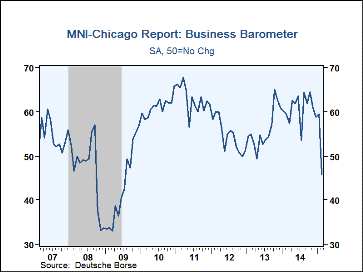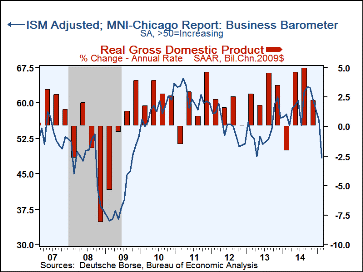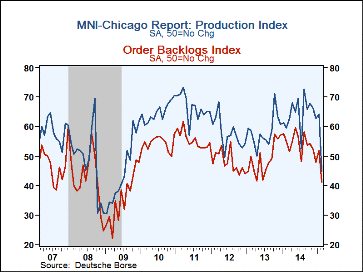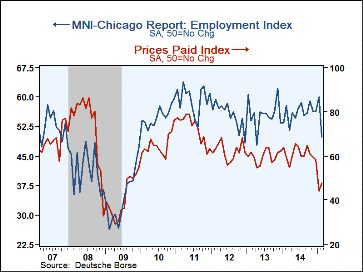 Global| Feb 27 2015
Global| Feb 27 2015Chicago Purchasing Managers Index Plummets
by:Tom Moeller
|in:Economy in Brief
Summary
Chicago purchasing managers indicated that their February Business Barometer Index dropped sharply to 45.8 this month from an unrevised 59.4 in January. Severe winter weather and a West Coast port strike were sited by the Purchasing [...]
Chicago purchasing managers indicated that their February Business Barometer Index dropped sharply to 45.8 this month from an unrevised 59.4 in January. Severe winter weather and a West Coast port strike were sited by the Purchasing Managers Association as having depressed activity. The reading was the lowest since September 2009 and fell short of expectations for 58.2 in the Action Economics Forecast Survey. Haver Analytics constructs an ISM-Adjusted Index, comparable to the overall ISM index to be released Monday. Our figure declined to 48.3, also the lowest level since September 2009. During the last ten years, there has been a 62% correlation between the adjusted Chicago Purchasing Managers index and real GDP growth.
Most of the component series were under pressure last month. The new orders index fell the most to 42.0 and was well below the high of 70.8 in May. The production series also fell sharply to 44.8, the lowest level since July 2009. The order backlog figure also fell hard to 41.1 and was under the 59.6 high last May. Employment dropped to 49.8, the lowest level since April 2013. During the last ten years, there has been an 82% correlation between the employment figure and the m/m change factory sector employment. Offsetting these declines was a modest rise in inventories to 46.7. The supplier delivery index also rose to 58.3, indicating a slowdown in delivery speeds.
The index of prices paid bounced up slightly to 47.8 but remained at the lowest point since the end of the recession in 2009. Sixteen percent (NSA) of respondents reported paying higher prices, the same percentage reporting paying less.
The MNI Chicago Report is produced by MNI/Deutsche Borse Group in partnership with ISM-Chicago. The survey covers a sample of over 200 purchasing professionals in the Chicago area with a monthly response rate of about 50%. The ISM-Adjusted headline index is calculated by Haver Analytics using these data to construct a figure using the ISM methodology. The figures can be found in Haver's SURVEYS database. The Consensus expectations figure is available in AS1REPNA.
| Chicago Purchasing Managers Index (%, SA) | Feb | Jan | Dec | Feb'14 | 2014 | 2013 | 2012 |
|---|---|---|---|---|---|---|---|
| ISM-Adjusted General Business Barometer | 48.3 | 56.2 | 58.5 | 57.7 | 59.4 | 54.3 | 54.8 |
| General Business Barometer | 45.8 | 59.4 | 58.8 | 59.5 | 60.7 | 56.1 | 54.6 |
| Production | 44.8 | 64.1 | 62.7 | 59.7 | 64.5 | 58.3 | 57.6 |
| New Orders | 42.0 | 61.6 | 59.8 | 62.7 | 63.8 | 59.2 | 55.1 |
| Order Backlogs | 41.1 | 51.9 | 48.0 | 55.0 | 54.2 | 48.9 | 48.0 |
| Inventories | 46.7 | 40.1 | 55.5 | 51.5 | 56.0 | 45.7 | 51.4 |
| Employment | 49.8 | 60.1 | 56.4 | 57.8 | 56.0 | 55.6 | 55.3 |
| Supplier Deliveries | 58.3 | 54.9 | 58.3 | 56.7 | 56.5 | 52.5 | 54.9 |
| Prices Paid | 47.8 | 44.2 | 58.1 | 59.5 | 61.0 | 59.9 | 62.2 |
Tom Moeller
AuthorMore in Author Profile »Prior to joining Haver Analytics in 2000, Mr. Moeller worked as the Economist at Chancellor Capital Management from 1985 to 1999. There, he developed comprehensive economic forecasts and interpreted economic data for equity and fixed income portfolio managers. Also at Chancellor, Mr. Moeller worked as an equity analyst and was responsible for researching and rating companies in the economically sensitive automobile and housing industries for investment in Chancellor’s equity portfolio. Prior to joining Chancellor, Mr. Moeller was an Economist at Citibank from 1979 to 1984. He also analyzed pricing behavior in the metals industry for the Council on Wage and Price Stability in Washington, D.C. In 1999, Mr. Moeller received the award for most accurate forecast from the Forecasters' Club of New York. From 1990 to 1992 he was President of the New York Association for Business Economists. Mr. Moeller earned an M.B.A. in Finance from Fordham University, where he graduated in 1987. He holds a Bachelor of Arts in Economics from George Washington University.
More Economy in Brief
 Global| Feb 05 2026
Global| Feb 05 2026Charts of the Week: Balanced Policy, Resilient Data and AI Narratives
by:Andrew Cates










